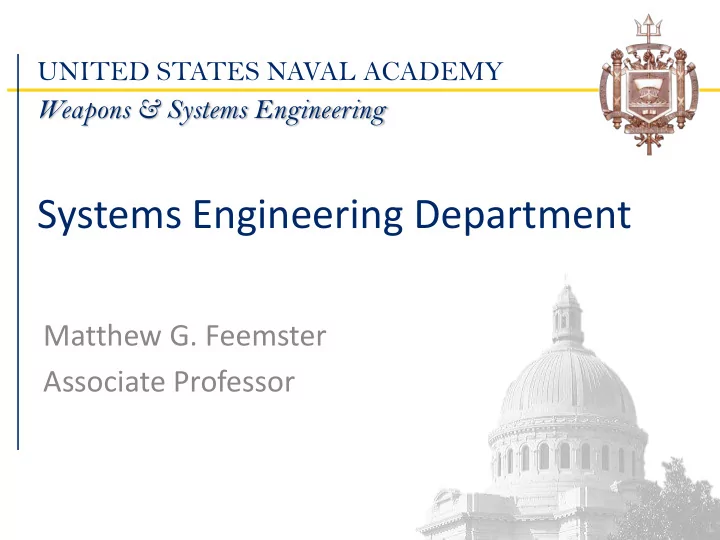

UNITED STATES NAVAL ACADEMY Weapons & Systems Engineering Systems Engineering Department Matthew G. Feemster Associate Professor
USNA Overview ▪ We are one of the five service academies (US Airforce Academy, US Military Academy, US Coast Guard Academy, US Merchant Marine Academy). ▪ Our total enrollment is limited to approximately 4400 students with graduating classes of 1000 students. ▪ Approximately 600 faculty members (300 civilian, 300 military). ▪ We are an undergraduate institution (no graduate students). ▪ All students must graduate in FOUR years. ▪ Class attendance is mandatory. ▪ All students are required to participate in a physical activity everyday along with mandatory military obligations.
Systems Eng. Dept. Overview ▪ 18 civilian faculty and 4 permanent military professors. ▪ Our student enrollment is currently : 91 seniors, 78 juniors, and 77 sophomores (246 total). ▪ Typical faculty loading is two sections in fall semester and three sections in spring (or vice versa). ▪ Faculty are interested in robotics, controls, or embedded micro computing. ▪ We offer an Honors program to approximately 20 students/year (this includes an 3 hour independent research course). ▪ Typically, instructors have one classless day for research endeavors.
Systems Eng. Curriculum Required courses with labs Technical electives (90% have associated labs)
Sophomore year experience ▪ ES200 - Introduction to Systems Engineering (3- 2 -4) (F) ▪ ES202 – Principles of Mechatronics (2- 2 -3) (S)
Junior year experience ▪ ES301 – System modeling and simulation (2- 2 -3) ▪ ES305 – Linear Control Systems (3- 2 -4) ▪ ES306 – Modern Control Systems (2- 2 -3) ▪ ES309 – A Guided Design Experience (0- 2 -2):
Course scheduling ▪ ES202 – Principles of Mechatronics ( 2 - 2 -3) (S) • One of the major difficulties of a project based learning/lab/mechatronic course is keeping the lab topic in synch with the lecture topic. Labs may not go as expected or experience hardware problems. Building flexibility into the syllabus as well as utilizing lecture time for labs aids in smooth execution of the course (here, the lab- classroom is a key resource). • Another difficulty is room capacity vs. student enrollment. Equipping two separate rooms is taxing on resources and staff.
Digital control systems syllabus
What do I need to teach mechatronics? ▪ In order have a successful mechatronics/PBL course/curriculum, you must have: • A committed faculty and technical staff are ESSENTIAL for a successful mechatronics program. • Enough space to conduct the course/curriculum. • The equipment and parts to execute the course/curriculum. • A constant funding stream to develop/maintain courses and curriculum.
Faculty ▪ What qualities/traits would make for a good mechatronics instructor (survey) ? • In hiring, I like to see some hardware experience in their graduate work. • Faculty need to be good at troubleshooting, but more importantly, they should be good at fostering troubleshooting skills in their students. • When hiring, I look for someone with lab/hands-on experience. A pure theorist would struggle to teach lab oriented courses.
Impact on Faculty ▪ What are some impact of a mechatronics curriculum/course on the faculty (survey)? • Increased time dedicated to the development and execution of lab based courses (course material, parts acquisition, and prototyping). • Increased time in course prepping (making sure labs are functional prior to students performing them). • Reduction of research productivity during active teaching semesters.
Technical Support Staff ▪ All of our faculty agree that we could not conduct our a project based learning courses/curriculum without a dedicated support staff. ▪ This team also develops hardware that extends our project capabilities.
Resources ▪ Space : Lab classrooms are extremely useful in project based learning courses. We estimate approximately 2(ft) x 2(ft) area/student. Be aware of not exceeding space capabilities.
Resources ▪ Parts : You can never can have enough (recycle projects and parts).
What topics are important to teach? ▪ What are some focus topics that need attention in mechatronics: • Troubleshooting skills – teaching students to diagnose problems and develop a methodology to fix the problem (subsystem testing). • Interfacing skills – teaching students to be aware and understand many available communication protocols (RS232, SPI, I2C, Servo/RC, CAN) between devices. • Power requirements: teaching students to be able to cognizant of power requirements of devices. • System design: teaching students to plan out their actions prior to prototyping. • Documentation: teach students to record their work.
Course assessment ▪ At the end of each cycle, assess the course outcomes and execution. Adjust as the course as needed. “Feedback is a beautiful gift. It truly is.” – Woodbadge course N-220-16-2.
Come visit ▪ If you are in the Baltimore/Washington DC area, I would like to invite you to come visit us at USNA. Matthew G. Feemster Associate Professor Systems Engineering Dept. U.S. Naval Academy 105 Maryland Ave. Annapolis MD, 21402 feemster@usna.edu (410) 293-6139
Recommend
More recommend